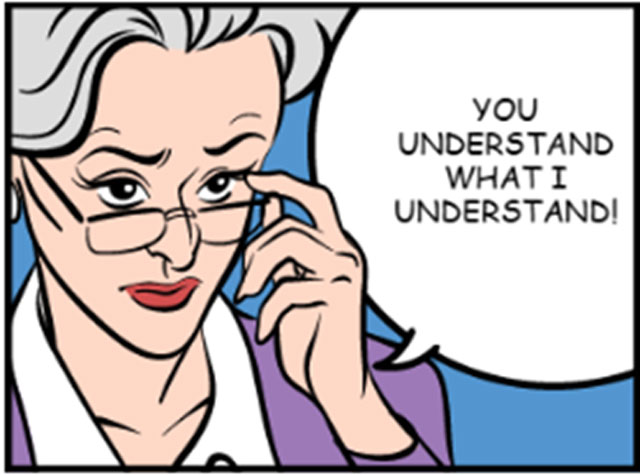July 25, 2025
English is the most widely studied language globally, linking countries and continents. Colloquial English is largely influenced by one’s mother tongue – especially in the way we speak, the way we pronounce words and sentences, in what is dubbed as ‘having an accent.’ Even in countries where English is a predominant language, the pronunciation of the same word tends to vary, swayed by local slang. Thus, English is a language that is a mystery to many. From its bizarre spelling rules to its free-for-all grammar, for thousands across the globe, it’s a daily struggle to form a sentence that makes sense and convey what is intended.
In this piece of writing, I have taken four instances in my life’s employment journey in different Organisations, involving my colleagues and I, where English was the culprit - one was out of taste, another was a tad serious, the other was indeed funny and yet another was confusing in itself – just one word to describe: hilarious!

My second permanent job in Australia was in one of the Big Four Banks (as they are called here), not the Big Four Bank where I am employed currently. In this country, apart from the slang that is a bit of a bother, the other weird thing is the pronunciation of certain words, especially by the Caucasian (Anglo-Saxon) race.
My Manager Mark Ford, a perfect gentleman, used to be at least half an hour early at his desk before the scheduled start time. I was normally the next one in – around 10 minutes before start, followed by other colleagues. Every working day, I had to pass my Manager’s desk to get to my seat. Each morning as I passed, used to greet him – ‘Good Morning Mark’ and walk in. His reply, ‘Nice to see you Stephen. How are you todie?’ I replied: Great mate, how about you? The pronunciation was such that it was definitely toDIE rather than toDAY. Day in and day out, hearing that word DIE, that too in the mornings irritated me generating a bit of negative energy.
I started finding ways to overcome this - many times even coming earlier than Mark, sometimes just walking in ‘on time’ along with a few others, rushing to my seat when he was on the phone. It seldom worked because if Mark had missed greeting someone, he used to come around wishing and when passing my seat greet. ‘Nice to see you Stephen. How are you to-DIE?’
One fine day, I wondered – how about replacing the word MORNING with MOURNING? From then on, it was Good MOURNING Mark. Would he be able to pick that up and question me and hear my explanation? Days passed and nothing seemed to happen.
In a fortnight however, during my 1 on 1 (monthly performance appraisal) conversation, Mark himself brought up the topic saying: “I hear you saying MOURNING instead of MORNING these days. We mourn when someone known has passed away” … bang! it was the right time I was waiting for and a perfect opportunity to put it straight. Laughingly, I said – ‘I am glad you brought that up.’ Since I am hearing you say today as TO DIE, I thought I better change my MORNING to MOURNING as the words DIE and MOURNING complement each other. He was shocked by my answer and was flabbergasted as he opined he meant it as TODAY and not what I was hearing. Well! he continued, if it doesn’t sound the intended way, let me say ‘Have a good one mate’ moving forward …
I reverted to MORNING from MOURNING – ‘Good Morning Mark’ and pat came his reply ‘Have a good one mate…’ and we worked happily ever after, during our times in that Bank!

Continuing with the not-so-pleasant word DIE - this story is from Abu Dhabi, United Arab Emirates – during my time in a multi-national Contracting Company. I had another position in the downtown Main Office, but when the Secretary of the Technical Manager was away, I used to cover for him, sitting in his seat. The Company had at least a dozen work sites running across the country, at any given time. All the Site Offices came under the Technical Manager, especially the administration-related.
One morning, I received a call from an Egyptian colleague from one of the Sites. Introducing himself only by his name, he said: “Your father died. You have to go to your country on leave.” My dad was ill those days and now this terrible news. I froze! I mistook the Site Office colleague for another Egyptian – the Head of Accounts in our Main Office building itself, with an identical name and tone. I thought he was relaying the news of a telephone call that was made from India having landed in the Accounts Department (it was an era without cell phones). The person on the other end of the phone repeated – “Your father died. You need to go to your country on leave. Transfer the call to the Technical Manager blease (please), so I (can) ask (apply) (for) leave.” This pronoun I (where by default he blurted out in Arabic) and his request to transfer to the Manager to ask (for) leave – I realised that the colleague was calling from a Site and his father had passed away, wanting to speak to the Manager to grant him leave so that he can fly to Egypt.
My heart skipped a few beats hearing the personal pronoun, possessive adjectives used by my Site colleague, English being his second language thus conveying a different meaning to what he intended to say, at the time of his bereavement!

Over to another story in the same Company. I received an Inter-Office Memorandum in paper format to accompany a team for a site visit. The leader of the team was a Pakistani Senior Quantity Surveyor, Gulzar Shad. The memo bore only my first name, hence I visited his Office to have my surname added to avoid a mix-up with another colleague Stephen Green.
Gulzar nodded that would be done, got up from his seat and walked over to the Secretary Ashok Kumar seated adjacent, advised him to open the saved copy of the memo and dictated my surname. Once done, he advised Ashok to place the cursor after the first alphabet of my surname and insert a POST OFFICE COMMA. The Secretary was so confused, he began typing the dual word ‘Post Office,’ as Gulzar screamed to delete it and simply insert a ‘post office comma’ after alphabet D. When Ashok still couldn’t get it, Gulzar himself discovered the apostrophe key on the keyboard and had it inserted.
Waiting a couple of metres away, hearing this ‘Post Office Comma’, I was taken aback by this new connotation that I had heard for the first time. I corrected Gulzar saying, ‘vooo post office comma nahin hai, bas ek apostrophe hai.’ Gulzar disagreed and advised unlike India, the educational system in Pakistan is excellent, he having studied in a good school. It has always been a ‘post office comma,’ not the word I mentioned, he mumbled as he got the edited memo printed, signed and handed over to me saying, ‘abhi, teek hua.’
In the mess, the Malayali Secretary did a balancing act saying, let’s avoid both ‘post office comma’ or ‘apostrophe,’ and just say ‘comma on top after D’ or whichever letter. Gulzar stuck to his guns saying it is indeed a post office comma and we can choose to call it however we want.
Years later - in Abu Dhabi itself, teaching in an Institute, I heard one of my Pakistani students Haniya Afzal, reading out likewise under TOEFL Reading Comprehension, as I wondered about the quality of education in Pakistan.
This was before googling came to the fore. So much for the power of knowledge!

This tale is during my employment in the Mother of all Banks in the United Arab Emirates, where I had an opportunity to work with the Emiratis (UAE Locals). We, as Examiners (Auditors) in the Banking Supervision & Examination Department (BSED), were sent offsite for examination of banks, money exchanges, insurance companies and other financial institutions on an annual basis, in addition to ‘auditing’ wherever warranted in special cases. This was such a case, a Liquidation audit of the Bank of Credit and Commerce International (BCCI) in Dubai, UAE, which had to cease operations after accusations of money laundering and fraud.
Our team leader was a local lady, Samia Al Shehi. After the day’s audit, the Examination team met at 01.00 p.m. (our duty time until 02.00 p.m.), where feedback was taken, points noted to discuss with the liquidation bank’s executives at the meeting scheduled at 01.30 p.m. each day. Samia and I would represent the team at this meeting. Though Samia was brilliant in her work, she would struggle to put across in English at the Meeting our needs for the audit, confusing the Executives. In one such meeting, as they still weren’t sure after Samia explained a couple of times our expectations - I took over answering their queries with clarity.
That meeting, she was a bit upset with me. After the Executives left the meeting room, she explained that it was not appropriate for me to take over unless she had given permission, this and that. I defended saying they were not across as to what she was trying to convey in the meeting everyday. As a result, we are not getting what we had requested, the next day. Listen, she said – you will only talk if I allow you to, OK. ‘You understand what I understand.’ I nodded, after all, she was our team leader.
This was the first time I understood what she was trying to convey that I should not take over unless she gives permission. Everytime, she would explain a task, which she herself was not fully across and at the end of it all, seek confirmation saying ‘You understand what I understand,’ leaving colleague/s confused even more.
So much for the want of clear-cut expression. Culprit: English!
This write-up is purely for humour, not targeting any individuals whose real names I chose to mention. We may have been the laughing stock of others unbeknown to us and many of us might have been the subject of ridicule, as none of us are perfect. It is this imperfection that makes the world so colourful, just as the ‘not so perfect English’ of an Aussie, an Egyptian, a Pakistani and an Emirati in this Article.
Also read: